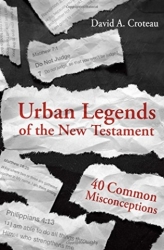I’ll admit it if you will: we don’t always understand the Bible correctly. And the really frightening thing is that, by the nature of the case, it happens more than we realize. David Croteau (PhD, SEBTS; Professor of New Testament and Greek in the Seminary and School of Ministry at Columbia International University) writes to disabuse us of forty – yes, 40 – mistaken notions regarding the New Testament that are commonly held. Brace yourself: within these 40 your understanding will surely be challenged at some point. You may be surprised to find how many commonly accepted understandings of various New Testament passages are mistaken … or, at least in need of tweaking.
· Was there “no room in the inn”?
· Was Jesus a carpenter?
· Did Jesus die at age 33?
· Is John 3:16 Jesus’ most famous quote?
· Was gehenna a garbage dump?
· Was “the eye of the needle” a gate in Jerusalem?
· Did Jesus sweat drops of blood?
· Is “go” commanded in the Great Commission?
· Was Paul a Tentmaker?
· Are pastors the ones appointed to do church ministry?
· Is money evil?
· Would God rather you be “cold” than “lukewarm”?
On the questions go, and you will likely be surprised how your own thinking needs adjusting at various points.
Although the book has a potentially offensive agenda – setting out as it does to correct us – it is a very enjoyable read and a helpful model of responsible biblical exegesis. Delightful reading for the professor, the pastor, and for any curious Christian.
Endorsements
Doug Moo
“Evangelicals rightly insist that ‘Scripture only’ is our source of truth. Yet our interpretations of Scripture sometimes owe more to tradition than to the Bible itself. David Croteau unmasks some common interpretations that have only dubious biblical support. But he does more than debunk these ‘myths’ of interpretation; he also helps us understand what these passages really are saying and why they matter. Perhaps just as importantly, he encourages all of us to be more careful and attentive readers of Scripture.”
Tom Schreiner
“As evangelicals who believe that Scripture is inspired and authoritative, we want to preach and teach what the Bible truly teaches. Croteau takes on a number of ‘urban legends’ and unpacks for us the meaning of a number of texts by paying attention to context and to historical background. Even if one were to disagree with Croteau here or there, one will be challenged to support alternative interpretations. This is a valuable resource full of wise advice and persuasive exegesis, and I hope it is read widely.”
Final Thoughts
If we believe the Bible to be God’s Word, then we must give every attention to interpreting it accurately and understanding it correctly. Croteau summarizes this goal very well in his final paragraph:
In the end our goal should be to interpret Scripture as accurately as possible, to apply that interpretation to our own lives, and to be transformed by God’s Word so that our lives may bring glory to the One who rescued us from an eternal destiny in hell. May God give us the passion, focus, and desire to see His Word understood correctly and lived out in our lives that He might receive glory.
Fred Zaspel
